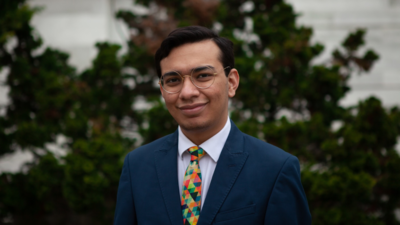Rohin Bhatt — who represented two couples in the marriage equality case in the Supreme Court last year — reflects on this duality in his debut book ‘The Urban Elite versus Union of India’. In an interview with Sharmila Ganesan Ram, the 26-year-old lawyer talks about the need to recalibrate the LGBTQIA+ movement
As a lawyer representing two couples in the marriage equality case, what was the lead up to the judgment like?
The wait for the judgment had been long and hard.
It felt as if we were holding our breaths. One was obviously anxious and worried about the outcome, for it was certain that the implications of the judgment would be far-reaching not just for the queer community, but also for others who do not have social sanction, like inter-caste and inter-faith lovers, since the Special Marriage Act was being challenged. The judgment was underwhelming, yet consistent with the recent trends in the Supreme Court and the judiciary where the courts have failed to act as an anti-majoritarian force. However, the loss was a much more personal one because I knew that it was not just ‘a’ case, but one that would deeply affect me and my life as well.
Is that why the narrative braids your personal experiences with the legal?
I think often when one talks about the law, one does it in a neutral fashion, as lofty ideals or formulaic principles that have to be applied to a given set of facts. But the law is hardly that — heart, emotions and psyche play a big role in how cases are decided. With the marriage equality litigation, one, and one’s community, were unwillingly, the subject of the law. The emotions during the hearing were frenzied and all-consuming even after the judgment. This book was not only a way of channelling those emotions as a therapeutic exercise, but also talking about the queer rights movement in India.
The book attributes a chunk of the progress made by queer rights activism in India to the work done by AIDS Bhedbhav Virodhi Andolan (ABVA) in the 1990s…
ABVA presents an early model of a social movement that was inclusive and cohesive. It had no funding, no office. It had members from 24 to 55-year-olds who ranged from residents of some of Delhi’s poshest colonies to pavement dwellers. Their activism was one of the main forces behind making sure that the AIDS (Prevention) Bill, 1989 was withdrawn. The bill allowed for the isolation, forcible testing, questioning of people who were living with HIV and lacked any provision in place which ensured the protection of confidentiality, or the protection of due process of law. Their reports tell us about the struggle that goes in building a movement. Post 2018 and Navtej, I think the queer movement has become much more judicialised. Winning cases is easier than winning hearts and minds. But also because we were, prior to the 2024 elections, political orphans. Few political parties openly supported queer rights. Thankfully, that has changed post-2018.
“Queer liberation will not and cannot be won solely through litigation,” you write. What makes you put on your black gown and show up in court daily?
The belief that the Constitution and the courts can work for the proverbial ‘butcher, baker and the candlestick maker’. I don’t think it is these big-ticket cases that make the practice of the law meaningful but the smaller ones, which often don’t make it to the front page of the newspapers, do. Getting a protection order from a violent natal family is one such example. However, to say that we will achieve equality through the courts is perhaps a myopic conclusion. Unless we put in the hard work of movement building, of changing attitudes, of politically lobbying with the State, I do not think queer liberation can be achieved.
Many argue that marriage itself is a faulty institution. Can marriage equality liberate the queer community?
Marriage, of course, replicates caste and class hierarchies, and queer marriage will do it too. Having said that, there is nuance to it. Our legal system recognises relationships in three ways: blood, marriage and adoption. Now for queer persons to have rights over their assets and their partner, marriage becomes a legitimate legal need. There is a case to be made for radical legal re-imagination of how we look at relationships, such as choosing our families, but that is a long-term project. In the meantime, our rights cannot wait, and marriage is one way of ensuring that partners have rights over natal families which are often sites of violence.


